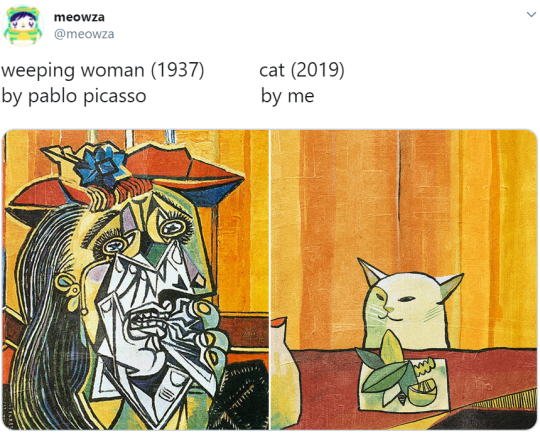Text
Why would you choose a bear over a man? Because since 1784 there have been 180 fatal bear attacks, while in 2021 alone, 81,100 women and girls were intentionally killed by men.
4K notes
·
View notes
Text
Le rompiste el corazón
¿Para qué?
Solo pudiste arrancarle un poema
3 notes
·
View notes
Photo
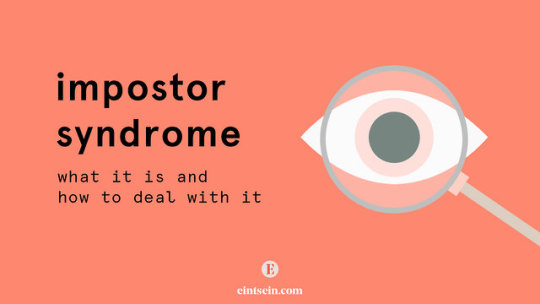
Impostor Syndrome: What it is and how to deal with it
There may be times when you feel like a fraud, like at any moment people will find out that you have no clue what you’re doing and you don’t deserve any of your achievements. You think that you’re unworthy of praise, that you only succeeded out of luck.
This is known as Impostor Syndrome, and around 70% of people have struggled with it in their lives. The problem arises when high achievers fail to internalize their success, i.e. when you attribute your success not to your own abilities but rather to external factors.
Some say that impostor syndrome could be linked to traits like anxiety or neuroticism. Impostor syndrome has also been commonly attributed to behavioral causes like childhood experiences, e.g. being labeled as “the smart one” or “the talented one”.
Another huge factor is how well you think you fit into a certain group, e.g. impostor syndrome is common among people of a racial/ethnic/cultural minority, women in STEM, and international students at US universities.
Dr. Pauline R. Clance was the first to design a scale to measure impostor syndrome based on six factors
The impostor cycle, where someone is given an achievement-related task and they either (a) overprepare or (b) procrastinate
The need to be special/the best
Superhuman characteristics
Fear of failure
Denial of ability and discounting praise
Feeling fear and guilt about success
There are different types of impostors, as categorized by Dr. Valerie Young, an expert on impostor syndrome (note that these categories aren’t mutually exclusive):
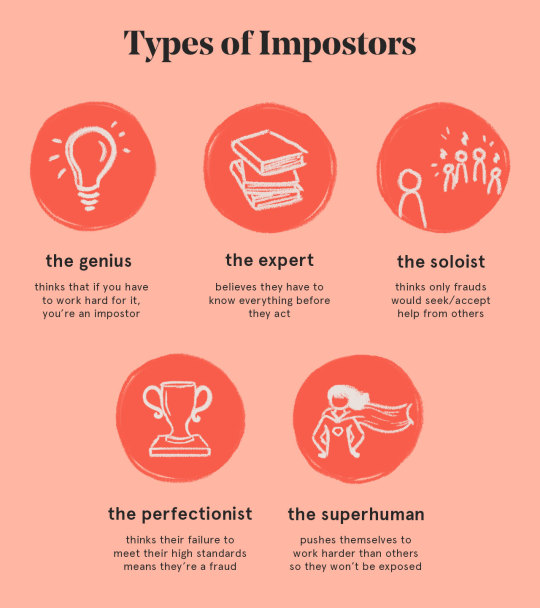
I’ve personally dealt with the first two types. I’m fairly certain I can attribute being ‘the genius’ to childhood/adolescent circumstance: I’ve been known as ‘the smart one’ throughout elementary school and high school - every time I made a mistake, it was met with a chorus of ‘wahh jo made a mistake…’ Even last month when I had a mini-reunion with some of my high school friends, one of them said something along the lines of “I like when Jo makes mistakes because it reminds me that she’s human, too.” I can definitely say I’ve overcome that now because, you know, college - everyone’s as smart or smarter than you and works pretty hard.
Being ‘the expert’ is still something I’m still trying to overcome. Last spring when I was applying to internships, I only dared to apply to those where I met 100% of the requirements. I’ve been coding for like 4 years but I constantly think I’m incompetent. It once got up to the point where I literally took 3 similar courses to assure myself that I actually do know how to do full-stack web programming. I still struggle to draw the line between relearning something because I don’t think I really know it, versus learning something for the expansion of knowledge.
How do I deal with it?
Firstly acknowledge that you have impostor-related thoughts Awareness is the first step to changing how you think and how you act.
How does impostor syndrome look like in a school/college setting? Examples include
You refrain from asking questions because you think other students/TAs/the professor will think you’re dumb;
You don’t respond to questions even though you kind of know the answer but you always think your answers aren’t right enough or that they’re simply wrong;
You don’t participate in discussions because you feel that you won’t add any value; or
You prevent yourself from having an opinion because you feel like you have no right to have one.
Reframe your thoughts
Think of their possible effects Do these thoughts help or hinder me? Will anything useful come out of thinking this? Acknowledge that not speaking up may mean slowing your team down or depriving your classmates of potentially valuable insights.
Separate fact from feeling Are they factual or simply a misinterpretation of my environment?
Differentiate feelings of fraudulence from feeling like an outsider Does my work show that I’m incompetent or is the fact that I’m the only female in a team of males/POC in a team of Caucasians make me think I’m inferior?
Stop comparing yourself to other people You might think something along the lines of “there are already so many people who can do what I do but so much better, so what’s the point in even trying?” However, remember that these people were once where you were, and taking even the smallest of actions could help you get to where they are.
Be more forgiving with yourself
Rethink perfection Not everything has to be perfect. Even if you have high standards, not achieving those standards doesn’t make you any less worthy.
Reframe mistakes and identify areas of improvement It’s okay to be wrong or not to know everything. Think of mistakes as learning opportunities and indicators of gaps in your knowledge/understanding of something, as opposed to a negative measure of your self-worth. Being wrong doesn’t mean you’re fake; it just means you have more to learn.
For example, previously I would only answer a question in class if I was at least 90% sure that was the correct answer. That’s a high threshold, and I don’t think it’s very useful for helping me learn and grow. Over the course of a year, I’ve managed to lower that down to I’d say around 60% (50% with coffee lmao).
Collect positive experience
Remember and reflect on praises Think about the efforts you exerted to help you achieve something and the positive responses you garnered when you finally achieved it. Remind yourself of the words of encouragement other people have told you, no matter how small. You could even keep a folder/document/journal to look back on when you feel like a fraud.
Heck, sometimes I feel like my posts aren’t useful or my designs are terrible, but then you guys tell me such kind things and I think, maybe I’m not as bad as I thought.
However, while it’s good to remember the good words people have said, don’t work just for the sake of praise. Focus on the value of the work itself and not the validation that comes from it.
Focus on providing value
Focus on what you can say Instead of thinking about what you don’t know, focus on what you do know and what you can say. Even if what you say isn’t entirely correct or relevant, it’ll get others around you thinking.
Remind yourself that holding back is like robbing the world of your ideas There’s always some value in your words, even if you don’t initially think so. How that value affects the world or other people may differ. For example, when you put forward an idea/thought in a discussion, it could be that
If there were parts that were incorrect, other people might have had the same misconception and are more than happy for the clarification;
Again, if there were parts that weren’t correct, they might not have had the same misconception but now realize that there is a way in which the subject can be misinterpreted, thus allowing them to have a more comprehensive understanding of the subject; and/or
It’ll stimulate further thinking and discussion and raise more questions, especially if other people wouldn’t normally think what you just thought. Then other people could bounce off your idea and form an equally great one.
Take action You won’t feel as much of a fraud if you’re doing something that brings you a little closer to achieving your goals or that adds value to your work.
However, be careful not to overwork yourself. Every time you start doing something, pause and think: is this really important to my progress or am I just trying to prove myself?
Instead of working on too many things, do something outside your comfort zone each day no matter how small. Once you do this, focus on quality (your growth) instead of quantity (the number of things you do).
Also, for those of you who fall into the ‘expert’ category, this also means practicing just-in-time learning, i.e. learning things when you need it, not just to comfort yourself.

I hope that was helpful, and please don’t hesitate to reach out if you have any questions/comments/suggestions :)
9K notes
·
View notes
Text


28-09-19 01/100 days of productivity
Studying for my Economics exam. Latetly I've been procrastinating a lot and I don't feel good doing so. Where's my motivation? Well, with a light breakfast and classical music, it's kinda solved for now.
40 notes
·
View notes
Photo



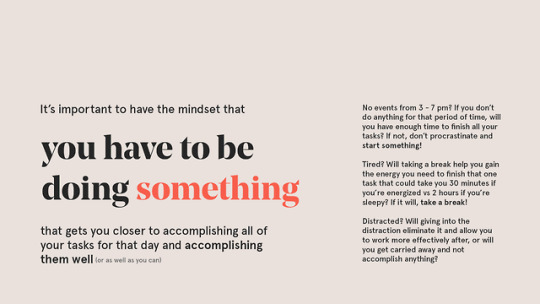

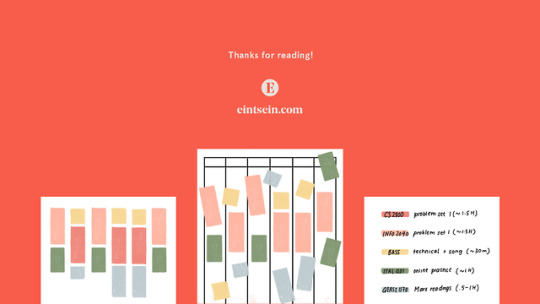
Flexible Time Blocking: A More Breathable Way to Get Things Done
I’ve met a lot of people who struggle with sticking to a schedule - myself included - so here’s one way you can get things done without restricting your spontaneity.
Linked: The ABCDE Method: Accomplish Tasks More Efficiently
Hope this helps!
12K notes
·
View notes
Photo

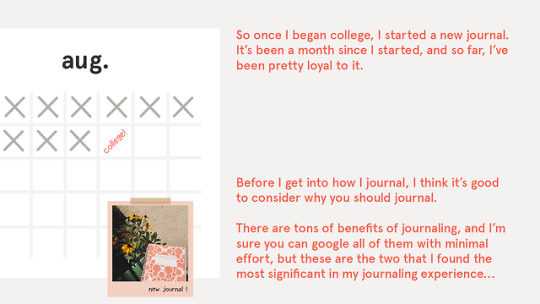

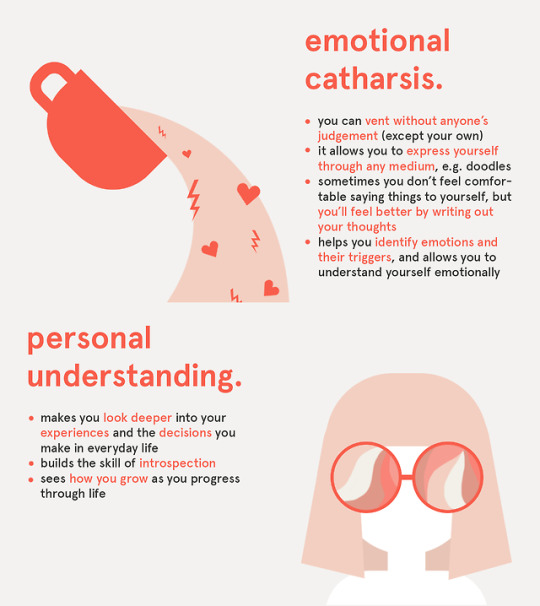


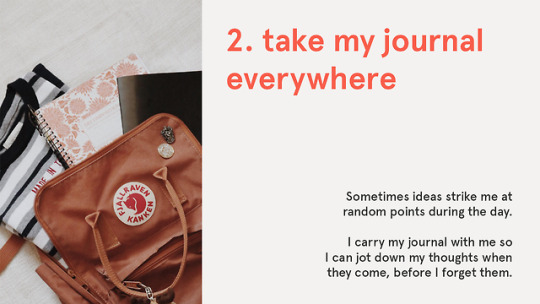

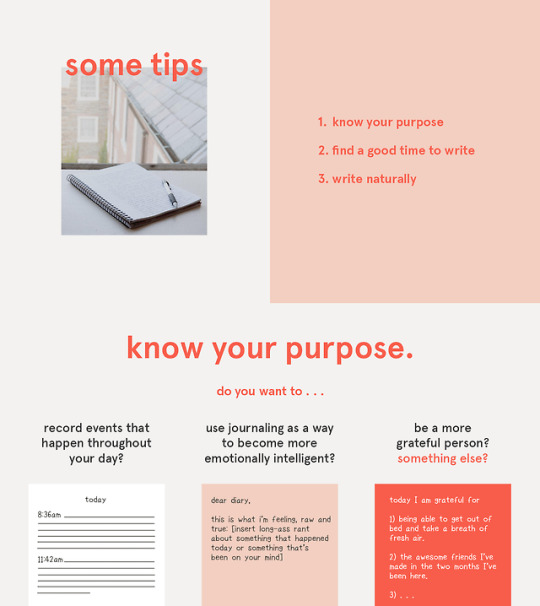
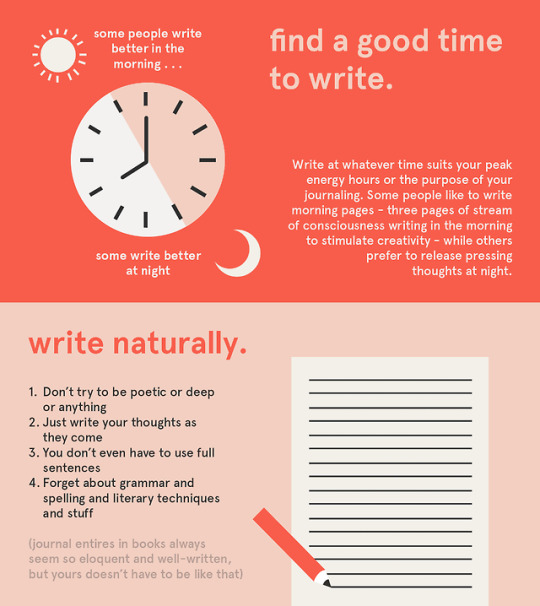
A Small Guide to Journaling by Eintsein
Something you may or may not know about be is that I journal. However, only recently have I gotten the hang of it and stayed loyal to the habit of journaling. Here are some tips and tricks on how you can journal successfully. Hope you like it :)
30K notes
·
View notes








